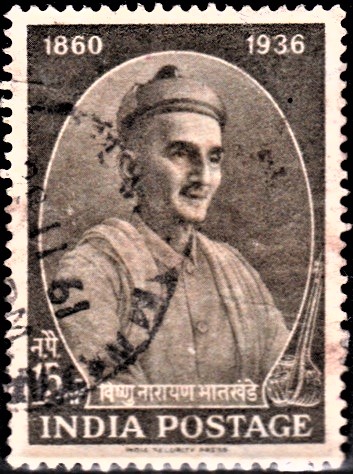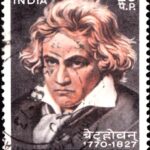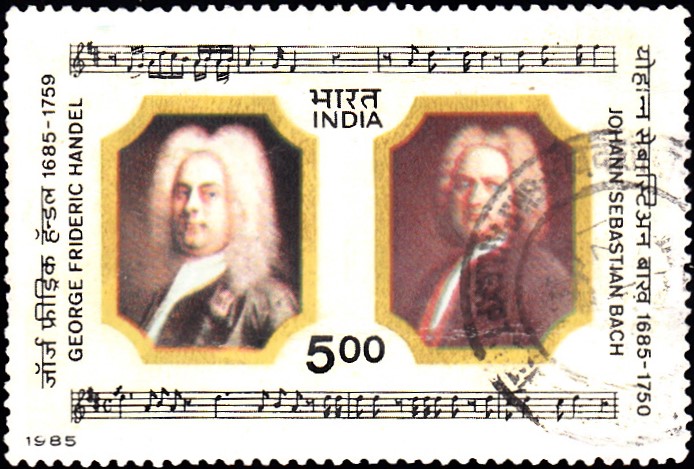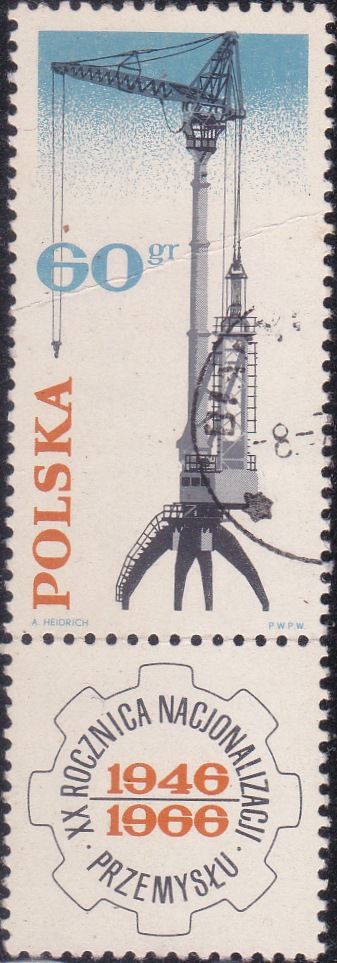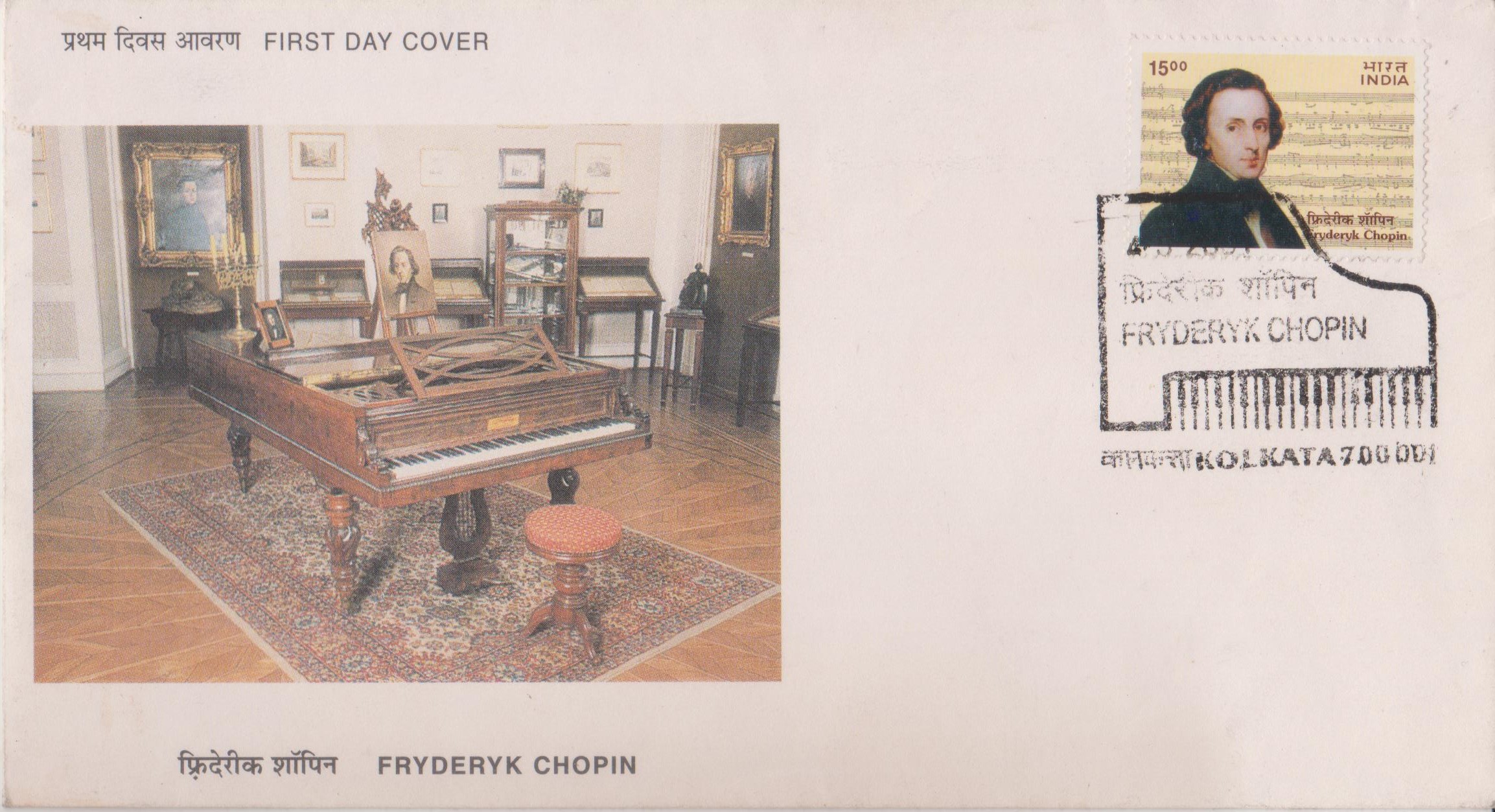
Fryderyk Chopin
A commemorative postage stamp on Fryderyk Franciszek Chopin, a Polish composer and virtuoso pianist of Romantic era (Western classical music) :
 Issued by India
Issued by India
Issued on May 3, 2001
Issued for : The Department of Posts is proud to issue a postage stamp in honour of this musical genius from Poland.
Design : The First Day Cover shows the last instrument of Fryderyk Chopin.
Credits :
Stamp & FDC : Based on inputs from the Embassy of Poland, New Delhi.
Cancellation : Nenu Gupta
Type : First Day Cover
Colour : Five Colour
Denomination : 1500 Paise
Overall size : 2.90 x 3.91 Cms.
Printing size : 2.55 x 3.60 Cms.
Perforation : 13.5 x 13.5
Paper : Matt Chromo
Stamps Printed : 0.4 million
Number per issue sheet : 40
Printing Process : Photo Offset
Printers : Calcutta Security Printers Ltd.
Name : Frédéric François Chopin
Born on Mar 1, 1810 at Żelazowa Wola, Poland
Died on Oct 17, 1849 at Paris, France
About :
- Fryderyk Chopin (1810-1849) was a composer from Poland, regarded by many as the greatest of all composers of music for the piano.
- The musical talent of young Fryderyk became evident in his childhood. Performing in local salons and giving public charity concerts, “little Chopin” became a sensation of sorts in Warsaw, where he grew up. He even came to be compared to the childhood genius of Mozart. A stint at the Warsaw Conservatory helped to develop his talent.
- Chopin gave his first concert as a piano virtuoso in 1829 in Vienna. Concerts in Vienna and Warsaw during 1829-30 led to increased critical and public acclaim.
- Meanwhile an uprising broke out in Warsaw against the political repression directed towards the Kingdom of Poland by Russia. Despair over the fate of his war-torn homeland, coupled with his musical ambitions led Chopin to move to Paris in 1831. With some help from his friends as well as contemporary musicians, he quickly established himself as a private teacher and salon performer. There was an aura around him, the image of the legendary artist being enhanced by frail health, attractive looks, a courteous manner and the piquancy attached to self-exile.
- Fryderyk Chopin came to be romantically involved with the French novelist George Sand. Their relationship which lasted nearly nine years, with a strong element of the maternal on her side, coincided with his most productive creative period. However, continued differences between the two ended in a final parting of ways in 1847.
- The disassociation from Sand was followed by a rapid deterioration of Chopin’s health and a long visit to Britain. His musical activity also declined, though he exerted himself to give several concerts in France, Scotland and England. He died of tuberculosis in October 1849, in Paris.
- Chopin is admired most for his originality in exploiting the piano. The rhythms and melodic traits of Polish folk music continued to inspire him even in the far away Paris. Another source of influence for his work was the Italian opera composer Vincenzo Bellini. Chopin’s music, romantic and lyrical in nature, is characterised by exquisite melody of great originality, refined harmony, subtle rhythm and poetic beauty. He greatly influenced other composers, notably the Hungarian pianist and composer Franz Liszt, German composer Richard Wagner and French composer Claude Debussy. At the onset of 20th century, the perspective of viewing Chopin changed from a Polish to a more global one. The emotional – ideological approach of Chopin as the embodiment of Romanticism gave way to an objective image of him as the great innovator and master of the composition workshop. The Fryderyk Chopin international piano competition which began in the nineteen twenties and is held annually in Warsaw, has become a great musical event and contributed to popularisation of the music of the great Polish composer. Today, as we enter the twenty first century, the music of Fryderyk Chopin continues to delight and astonish the audiences as much as it did in the first half of the nineteenth century.
- Text : Based on inputs from the Embassy of Poland, New Delhi.



